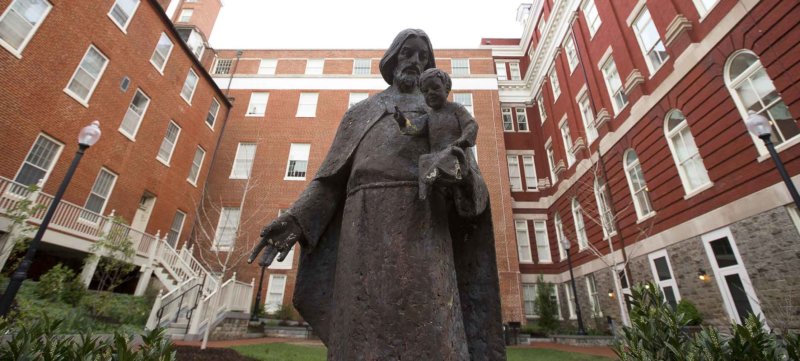WASHINGTON (CNS) — The issue of Georgetown University selling slaves more than 180 years ago to get out of a debt that could have shut down the institution is “bigger than Georgetown,” said one of the roughly 8,000 known descendants of those enslaved African Americans.
“Because the truth sets us all free, in finding that out, we began to look at, study and impel the Jesuits to do something,” said Cheryllyn Branche of New Orleans, a retired Catholic school principal who is president of the GU272 Descendants Association — named after the 272 slaves known to be sold by Georgetown — and co-chair of the GU272 Foundation Committee.
“There was an apology, but for us, we needed more and we continue to seek more,” Branche said during a Nov. 15 webinar, “Open Wide Our Hearts — The Sin of Jesuit Slave Holding: Continuing the Conversation on Racism.”
Jesuit Father Tim Kesicki, president of the Jesuit Conference of Canada and the United States, has been Branche’s dialogue partner for most of the past four years.
Knowing the history of black subjugation in American society is one thing, Father Kesicki said, but “that history became very real when I learned for the first time through The New York Times and other media outlets of the sinful sale.”
On Easter Tuesday of 2016, Father Kesicki issued an apology on behalf of the entire Jesuit community to the descendants. “The apology was just a first step, and we’re moving toward what truth, true healing and reconciliation looks like,” he said.
In assessing the fruits of the dialogue thus far, Branche said, “We hope to be leaders in understanding how you reconcile something that is so gravely cynical. For all of us there has been a great deal of personal and spiritual recovery. Of course, we begin with ourselves as individuals.”
She added that descendants “are not monolithic in thought. There are many thinkers and those who agree that a process like this is one that could drive meaningful change.”
Similarly, Branche noted, descendants don’t show unanimity about the redress Georgetown and the Jesuits owe the descendants.
There are some descendants who want cash now, she said, but “we cannot be paid for the lives of our ancestors. We prefer reconciliation because we have to reconcile our history, the truth, our work together.”
“We think that (reconciling) the past, although it will involve money, will be a trust,” she said, adding that “40 acres and a mule did not work” for freed slaves immediately after the Civil War. “The focus of our organization is a foundation and trust to last into perpetuity,” Branche added.
Georgetown’s archives provide disturbing details on slaveholding, she said.
“It continues to mystify me how a pregnant woman could be in the parlor of a priest’s home and could be whipped,” Branche said. “Something like that is unconscionable. It drives me visually to contemplate what happened.” Some of the priests’ actions were “brutal,” she added. “At the same time, there were priests who felt they were in relations (with slaves), but did not want them to be sold. There were acts of kindness, but there acts of sheer brutality that make me tremble.”
The dialogues with the descendants are similar to what Jesuits have experienced in Canada, Father Kesicki explained.
“A lot of work that the Jesuits in Canada have done with the Truth and Reconciliation Commission,” he said, “particularly with their history in the boarding schools. There was abuse, but one of the great sins is the sin of assimilation, trying to assimilate into the dominant culture. That, I think, leads the way for us in North America as a very strong effort of the Jesuits with the First Nations.”
The biggest takeaway for Branche in the ongoing dialogue is “relationship-building among the descendants, then leading the direction, in Jesus, is the direction that we want to go to. (It) is the one demanded.”
She said, “We have to move forward by stepping out of our comfort zone, out of the status quo. … Staying where you are and … not making change is what’s holding us back.” Father Kesicki added that perseverance is important. “It’s a lifelong journey. It’s a lifelong journey that demands action,” he said. You can’t turn back. You can’t turn back. We’re going forward.”
“We’re committed to not turning back,” Branche said.
Copyright ©2019 Catholic News Service/U.S. Conference of Catholic Bishops.


